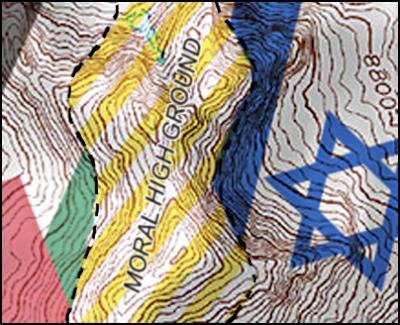My Side In The Gaza Conflict Is Entirely Right
Tuesday, January 20, 2009

When people are being killed and dying is not the time to apportion blame.
But since the deal between Israel and the US has made peace between Israel and Hamas, I say, how about now?
Unlike some, I look forward to responsiblity sheeting home to the most guilty, because throughout the conflict my side has been entirely in the right.
I should mention which side that is. I'll be clear: I support the good guys.
This ethical purity means one doesn't have to resort to anything as hamfisted and subjective as counting the number of innocent people the other side have killed or how psycho they are or whether - irrespective of what they might say - certain people's actions are really making the world a better place.
Never mind the death and destruction, our policy has from the beginning been to secure the moral high ground.
What you do not understand is that the people of the country I support are living in a climate of fear, caused by the bad guys. We have a monopoly on this suffering and must fight for our freedom using whatever means we have at our disposal, however extreme or irrational they may appear.
Nor do you know the history of the region. Some might prefer to pretend that history began on a certain day of their choice (and they are selective even then). In reality, the important issues in this conflict are all the bad things they have done to us.
They have repeatedly committed war crimes and been constantly condemned by the UN. They have breached at least some of the ceasefires. We are obliged to protect our people from these provocations.
Plus, our dead people count for more than theirs.
The dangerous lunatics on the other side seem incapable of distinguishing between the actions of our military and our civilian population. What would you expect from a nation so sick that their politicians can get electoral support by attacking another people? Though perhaps regrettable, it is right that they should all be punished for their complicity.
Especially since their leaders could have stopped the fighting at any time by ceasing their attacks. I wonder how they can sleep at night.
The people of the nation I support are a proud semitic people and they were there first.
Since the others started it, nothing that follows is our fault.
Whatever the others may have said in the past, it is clear from their actions that they would annihilate us if they could. Whereas all we want is a reasonable peace on our terms. And our actions are all well-thought-out steps that are in fact likely to lead to that state of affairs.
This may cause civilian casualties by we must defend our right to exist as a nation. However the actual number of casualties on either side is only relevent if they support my case.
Despite the immense procvoation of the murderers on the other side, we do not target civilians. Sometimes it happens that we hit them anyway. And we do fire at random into crowded areas from time to time, but only because we're forced to.
From time to time some of our supporters - especially on the fringes - may seem overly jingoistic and self-righteous, but we need to counter the one-eyed ravings of our opponents.
It does not help that the media is clearly biased against us, despited the transparent and sanctimonious lies of their official spokemen.
Fortunately, we have the support of the important parts of the international community.
Also, though I'm not clear exactly how this works, I am obliged to support the side I do because of my position on the liberal/conservative spectrum.
I short, it is obvious that we are entirely right and they are entirely wrong. This position is the best way forward and anyone who thinks differently is a dangerous idiot.
Labels: gaza, israel, middle east, satire, war


